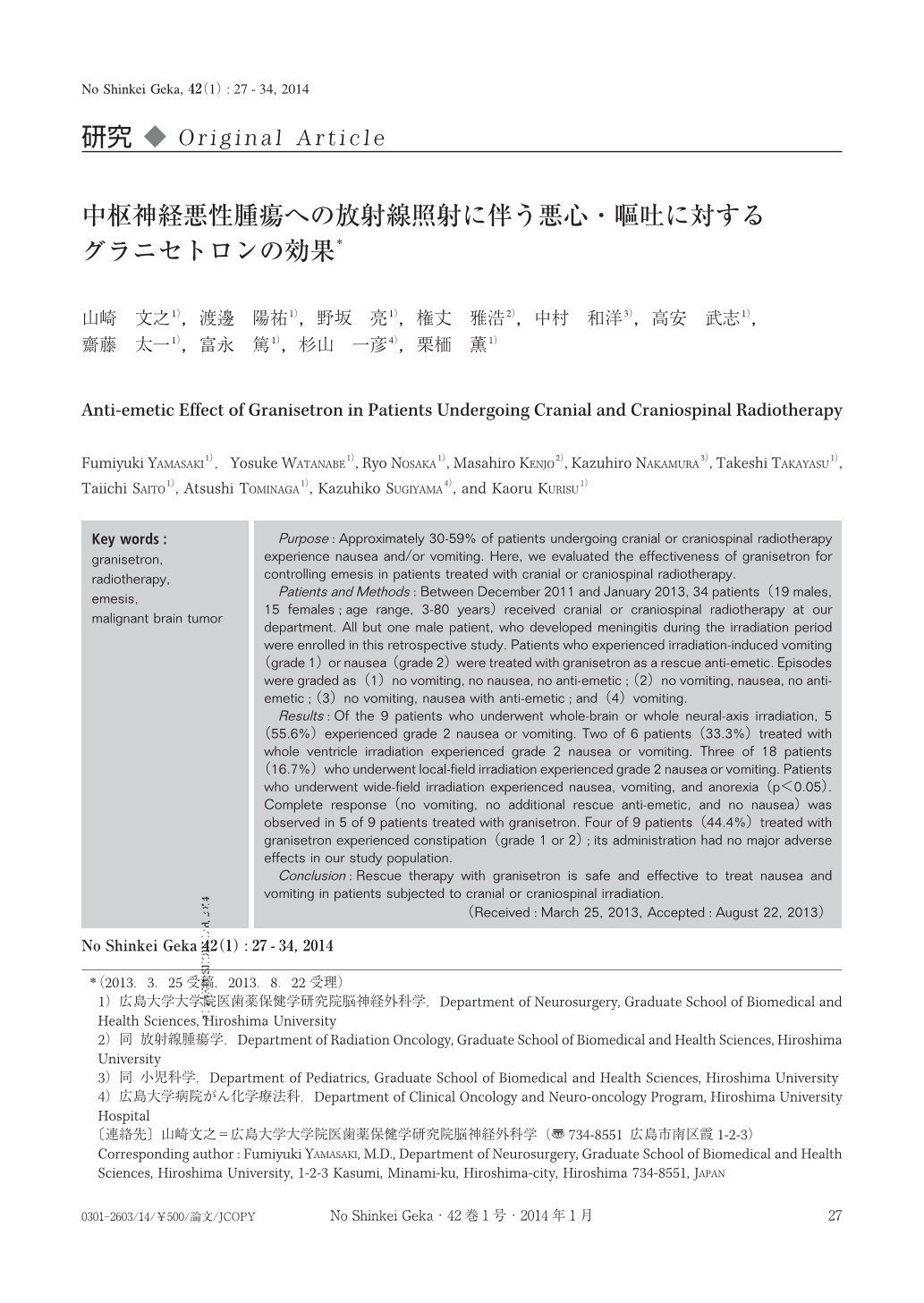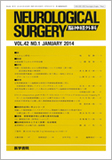Japanese
English
- 有料閲覧
- Abstract 文献概要
- 1ページ目 Look Inside
- 参考文献 Reference
Ⅰ.はじめに
放射線治療は,脳腫瘍を含めた癌の治療において非常に重要な地位を占める.放射線治療により悪心・嘔吐を来すことは以前から報告されているよく知られた事象であり12,17),照射部位,1回線量,総線量,線量率,分割回数,照射体積,照射部位などの放射線治療因子,さらに患者体位,放射線治療前や治療中の併用治療,患者の全身状態に影響される3).悪心・嘔吐が十分に制御できないと患者のquality of life(QOL)は低下するが5,14,18),放射線治療による悪心・嘔吐は,化学療法によるものと比べて発現頻度が低く,重篤度も低いことから,実態よりも過小評価されやすく2,16),放射線嘔吐症に対する症状緩和治療は十分には行われていない可能性があることが報告されている2).
前向き観察研究での,脳腫瘍に対する放射線治療による悪心・嘔吐の発現頻度は40.4~45%と報告され,American Society of Clinical Oncology(ASCO)やMultinational Association of Supportive Care in Cancer(MASCC),European Society for Medical Oncology(ESMO)のガイドラインでは脳または脳脊髄照射はlow riskに分類され,その悪心・嘔吐の発現頻度は30~59%とされている4,11).これまで本邦では,これらの患者に対してステロイドや濃グリセリン・果糖注射液の投与がなされてきたが,2011年12月に放射線照射時に発生する悪心・嘔吐に対しても5-HT3受容体拮抗型制吐剤のグラニセトロンの使用が認可されたため,本邦も海外のガイドラインと同様に制吐剤が使用可能な状態になった4,11).しかし,添付文書中の効能・効果に関連する使用上の注意には「放射線照射に伴う消化器症状に対し使用する場合は,強い悪心,嘔吐が生じる全身照射や上腹部照射等に限り使用すること」とされている.脳または脳脊髄放射線照射はときに強い嘔吐症状が出現し得るため,「全身照射や上腹部照射等」の“等”に当てはまるとも考えられるが,脳または脳脊髄放射線照射に対する5-HT3受容体拮抗型制吐剤の効果を検討した報告は極めて少なく11),臨床上の有用性は明確にされていない.そこでわれわれは,2011年12月以降に当科にて脳または脳脊髄放射線照射を行い,悪心・嘔吐を来した患者に対して,グラニセトロンを使用して効果を検討し,文献的考察を加えて報告する.
Purpose: Approximately 30-59% of patients undergoing cranial or craniospinal radiotherapy experience nausea and/or vomiting. Here, we evaluated the effectiveness of granisetron for controlling emesis in patients treated with cranial or craniospinal radiotherapy.
Patients and Methods: Between December 2011 and January 2013, 34 patients(19 males, 15 females;age range, 3-80 years)received cranial or craniospinal radiotherapy at our department. All but one male patient, who developed meningitis during the irradiation period were enrolled in this retrospective study. Patients who experienced irradiation-induced vomiting(grade 1)or nausea(grade 2)were treated with granisetron as a rescue anti-emetic. Episodes were graded as(1)no vomiting, no nausea, no anti-emetic;(2)no vomiting, nausea, no anti-emetic;(3)no vomiting, nausea with anti-emetic;and(4)vomiting.
Results: Of the 9 patients who underwent whole-brain or whole neural-axis irradiation, 5(55.6%)experienced grade 2 nausea or vomiting. Two of 6 patients(33.3%)treated with whole ventricle irradiation experienced grade 2 nausea or vomiting. Three of 18 patients(16.7%)who underwent local-field irradiation experienced grade 2 nausea or vomiting. Patients who underwent wide-field irradiation experienced nausea, vomiting, and anorexia(p<0.05). Complete response(no vomiting, no additional rescue anti-emetic, and no nausea)was observed in 5 of 9 patients treated with granisetron. Four of 9 patients(44.4%)treated with granisetron experienced constipation(grade 1 or 2);its administration had no major adverse effects in our study population.
Conclusion: Rescue therapy with granisetron is safe and effective to treat nausea and vomiting in patients subjected to cranial or craniospinal irradiation.

Copyright © 2014, Igaku-Shoin Ltd. All rights reserved.


